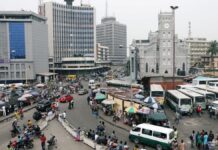Ogun State: GCR Affirms BBB+ Rating With Concerns over Debts, Liquidity
GCR Ratings has affirmed the national scale long-term Issuer rating of BBB+ (NG) to Ogun State Government, indicating high certainty of timely payment of long term obligations and assigns a national scale short-term Issuer rating of A2 (NG), with the outlook accorded as stable.
However, the emerging market focused ratings agency raises concerns over waning fiscal metrics of the state, saying that foreign currency debt exposed the state government to the devaluation of naira aside from its weak liquidity position.
According to the firm, the ratings of the Ogun State Government of Nigeria are largely underpinned by its robust internal economy, benefitting from its proximity to Lagos.
However, it said this is counterbalanced by high gearing and a deterioration in liquidity position, noting that Ogun State is one of the major economic hubs in Nigeria, with sizeable industrial and agricultural activities.
The State’s strong industrial growth and relatively diversified economy are noted to be supported by its proximity to the country’s largest economy, Lagos, and favourable demographics.
Accordingly, socio-economic metrics are stronger than the national average and per capita income is high, as are literacy and education levels, GCR added, adding that has resulted in the unemployment rate trending below the national average.
Nevertheless, the ratings consider that Ogun State still lags necessary Infrastructure to support its expanding industrial base and rapid population growth.
“GCR takes note of the various catalytic projects to boost the infrastructure profile of the State and the planned debt financing to drive rapid expansion over the medium to long term”.
It was noted that the state operating performance is slightly positive, balancing the strong progression in internal revenue generation (IGR) against the lack of flexibility to curtail consumptive expenditure.
In this regard, while IGR has generally increased in the prior years, it declined by 39% in the financial year 2020 to register at N51 billion, lower than N81 billion seen in 2019, chiefly due to COVID-19 related disruptions.
Nevertheless, the ratings agency insists that Ogun State remains dependent on federal transfers, for about half of its recurring income.
It added that consumptive expenditure has been relatively well managed, but personnel cost surged above 33% of total expenditure in 2020 due to the implementation of the new minimum wage and COVID-19 related incentives paid to front liners.
Accordingly, the increase in expenditure position narrowed state operating surplus, resulting in a decline in developmental spending for the second consecutive year.
Over the rating horizon, GCR expects improved revenue performance, driven by IGR and value-added tax growth to support operating surplus and capital expenditure implementation.
“With the adoption of accrual IPSAS, GCR has not taken a negative adjustment for Management and Governance as the current financial reporting framework has improved disclosure”.
In addition, GCR notes that the Auditor General of the State has not flagged any major issues and a clean audit report has been issued in each of the past five years.
Nevertheless, the emerging market ratings firm cast a further caveat, saying the timeliness and accuracy of information provided remain a concern. It said specifically that Ogun State’s high debt level remains a constraint to the rating.
“While gross debt increased slightly to N131 billion in the fiscal year 2020 from N125 billion in 2019, credit protection metrics deteriorated due to the weaker income.
“Thus, net debt to recurrent income registered at 120% from 53% in 2019, whilst operating cash flow to gross debt fell to just 8% from 30% in 2019 and operating cash flow coverage of net interest dipped to 2.1x in 2020 from 2.8x a year earlier.
In addition, GCR said the high utilisation of foreign currency-denominated loans is a concern as there remains a downside risk to the Naira exchange rate over the short to medium term.
However, it noted that these concerns are somewhat offset by the concessionary nature of the loans, evidenced by low-interest rates and long maturity profile.
“Most loans are received from the Federal Government of Nigeria and development partners, suggesting low refinancing risk”.
Based on the state fundamentals, GCR expects slight improvements in gearing metrics as revenue is expected to recover from the 2020 level, while only moderate additional borrowing is expected.
Ogun State’s liquidity position has deteriorated somewhat, with a lower cash holding of N9 billion as of 2020 N21 billion in 2019 and a resulting decline in days cash on hand to 31 days compare with 63days recorded in 2019.
To conserve cash, GCR said the State has diverted some payables majorly related to employee benefits, resulting in an increase in unfunded liabilities.
“While this may support liquidity management through the COVID disruption, it does suggest liquidity pressure over the medium term”.
Read Also: GCR Positions Dangote Cement on Highest Rating Scale
Over the outlook period, GCR expects uses against sources coverage to be around 1x -1.5x predicated on improved operating surplus and strong cash holding, sufficient to cover loan servicing and repayment, and Capital expenditure spend.
“The stable outlook reflects view that Ogun State will continue to grow its strong IGR base, which should support an improvement in gearing metrics to historical levels”, GCR stated.
Ogun State: GCR Affirms BBB+ Rating With Concerns over Debts, Liquidity












